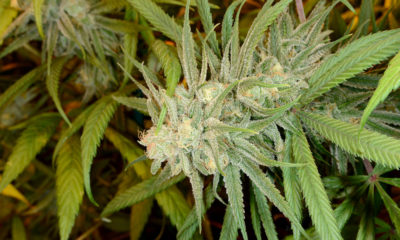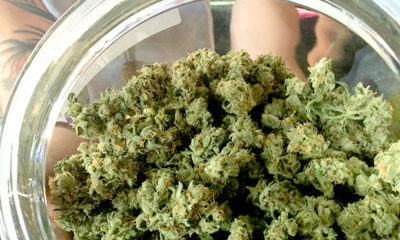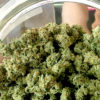
Medical
Why Alcohol & Cannabis Are Best Frenemies
How booze and bud go hand in hand — and no, not just when you’re double-fisting.
Alcohol and cannabis are America’s two favorite sources of inebriation. But despite their somewhat parallel popularity, the two substances have followed radically different paths in how they are viewed, particularly by the eyes of the law.
Socially, we know they are often enjoyed in tandem. When it comes to their chemical impact, it makes a big difference which one hits your lips first. And, as is often the case with alcohol, the relationship between them ranges from jovial to adversarial, with a lot of complications in between.
Amplifier or Dampener?
There is no simple answer to how alcohol and cannabis combine in the body and mind, because the effects change based on which enters the system first. A smoke before or shortly after a drink makes one absorb less alcohol than the drink by itself due to the effect of weed on intestinal motility — which is to say, cannabis affects how alcohol moves through the body. On the flip side, a pre-cannabis drink can amplify the high, an effect shown in both subjective reports and chemical studies, like this one from the American Association for Clinical Chemistry. Alcohol increases the absorption of THC, and this is detectable in blood samples and mood.
Of course, both cannabis and alcohol can have widely different effects based on an individual’s tolerance and biochemistry. One person’s smooth sailing is another’s rocky seas, and this is doubly so when combining substances. For many, the combination can tip into nausea very easily — we’ve all held a “crossfaded” companion’s hair back or fetched them a glass of water while they regurgitated the results of being too gung-ho about smoking and drinking. As always, taking things slow and steady is advisable.
A Tale of Two Prohibitions
There’s a reason we so often refer to the federally criminalized status of cannabis as “prohibition”: It invokes alcohol prohibition, an experiment that has more or less universally been deemed a failure. From 1920 to 1933, alcohol could not be produced, imported or sold in the United States. This pushed alcohol consumption into the illicit market and turned bars into speakeasies (which, post-prohibition, became just another type of bar).
But unfortunately, as alcohol prohibition ended, cannabis prohibition gained steam. It eventually became federal law via the Marihuana Tax Act in 1937, and, of course, remains illegal in the U.S. to this day. But at the state level, legalization is spreading in the West and Northeast, while making inroads in the Midwest.
One of the key levers cannabis advocates have used to pry away at criminalization is the example of alcohol prohibition. Every point about the problematic impacts of cannabis use can be met with a counter about the much more severe impacts of alcohol. According to the Center for Disease Control and Prevention, alcohol killed roughly 88,000 Americans and caused 2.5 million years of potential life to be lost each year between 2006-2010. In economic costs, excessive drinking cost the U.S. an estimated $249 billion in 2010 alone.
Vox’s Ezra Klein has argued that the primary public health effect of legalizing cannabis will be how it alters alcohol consumption levels. Yet alcohol is widely available for purchase and can be consumed publicly in bars and restaurants without fear of recourse.
Cannabis, meanwhile, still has no deaths to its name as a direct result of consumption. From what we know, the long-term health effects are less severe than alcohol’s, as is its capacity for addiction. The behavioral effects of pot lean toward silliness and away from violence. It takes all sorts of rhetorical bank shots to make a coherent case that alcohol should be legal and cannabis should be criminalized, yet that has been true in the U.S. for nearly a century. The comparison itself was essentially put in legal terms when Michigan voters passed adult-use legalization in 2018, a referendum led by a coalition named “Regulate Marijuana Like Alcohol.”
The alcohol industry has historically used its legal status to try to keep competition out of the market by lobbying for continued criminalization, including as recently as 2018. Other alcohol groups have figured it’s time to get in on the action, or at least involve themselves in the still-emerging regulatory processes around cannabis.
Though a smoke and a drink go literally hand in hand for some people, alcohol and cannabis have been both allies and adversaries in the public eye. With legalization making more and more progress, alcohol will need to make room for America’s other favorite substance.
TELL US, do you ever drink while you toke — or vice versa?























